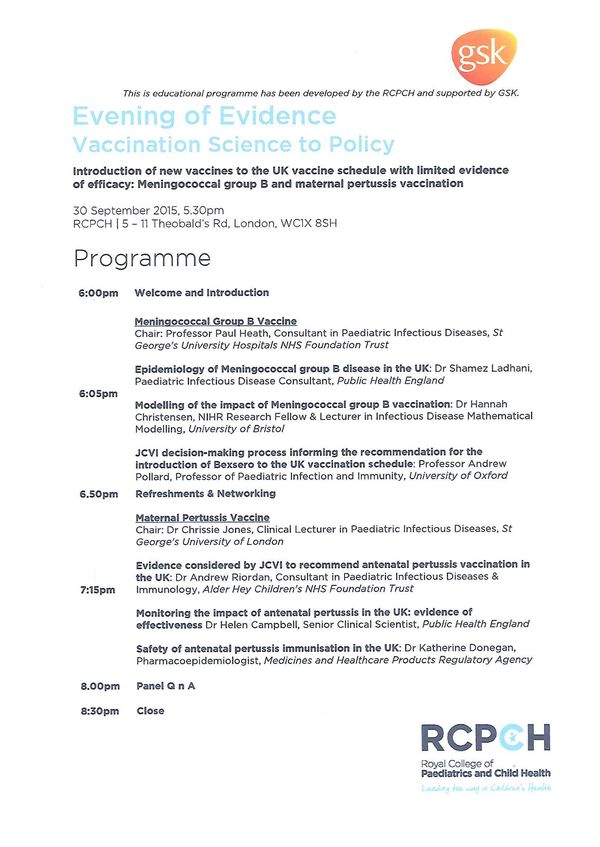
Bexsero vaccine (meningitis B) JCVI Pollard, Andrew Glaxo
GSK Document Appears to Show Vaccine Committee Chair Used Position to Favour Own Product
Dec 2015
By John Stone

Prof. Pollard

Dr. Riordan
The chairman of the Joint Committee on Vaccination and Immunisation (JCVI), the British equivalent of the ACIP (Advisory Committee on Immunization Practices), Prof Andrew J Pollard spoke this September at an event sponsored by vaccine manufacturer GlaxoSmithKline "Evening of Evidence/Vaccination Science to Policy: Introduction of new vaccines to the UK vaccine schedule with limited evidence of efficacy (sic): Meningococcal Group B and maternal pertussis vaccination". Prof Pollard spoke on the subject of Meningitis B vaccine which he helped to develop and latterly seems to have superintended the process of having it added to the United Kingdom vaccine schedule as chairman of the JCVI – his talk was entitled: "JCVI decision-making process informing the recommendation for the introduction of Bexsero to the UK vaccination schedule". Bexsero vaccine was developed by Novartis but their vaccine division was acquired by GSK earlier this year, following the approval of Bexsero vaccine by the JCVI (negotiations began within days of the JCVI approval). A deputy chair of the JCVI, Dr Andrew Riordan, spoke at the same meeting on the subject: "Evidence considered by the JCVI to recommend antenatal pertussis vaccination in the UK". GSK also manufacture Boostrix – in fact a pertussis, tetanus and diphtheria vaccine – which is the product currently given to pregnant women in the UK, which also has an aluminium adjuvant.
Last week members of the Scottish Parliament heard how Prof
Pollard apparently chaired a session of the JCVI in March 2014 which recommended
Bexsero for British infants, though the committee under a different chairmanship
had rejected it months earlier. It was not disclosed on the records of the
committee that Prof Pollard was “named in patents in the field of meningococcal
vaccines” and was contracted in continuing research relating to Bexsero. The
JCVI revised Code Of Practice requires that the Chair “cannot have any interests
that may conflict with his or her responsibilities to JCVI” and also that “the
JCVI Chair and Sub committee chairs cannot have interests that could conflict
with the issues under consideration by the JCVI or Sub Committee respectively”.
Prof Pollard also heads the Oxford Vaccines Group, which though an agency of the
National Health Service owes its existence to accepting contracts from pharmaceutical
manufacturers and other bodies trying to promote vaccines.

It is disturbing to note that every single one of the eight speakers at the GSK sponsored event, hosted by the Royal College of Child Health and Paediatrics were in some way employees of the British state including bodies such as Public Health England (which is supposed to provide independent scientific advice) and the MHRA (the UK licensing authority). The drinks interval was nudgingly billed on the flier as “Refreshments and Networking”.
That the Bexsero Meningitis B vaccine is at the very least controversial is underlined by its rejection by the Australian Pharmaceutical Benefits Advisory Committee:
- The PBAC rejected the re-submission requesting listing of the 4CMenB vaccine on the NIP Schedule for the prevention of meningococcal B disease in infants and adolescents. The basis of the rejection was that the re-submission did not address multiple uncertainties in relation to the clinical effectiveness of the vaccine against the disease when delivered in a vaccination program, that the use of optimistic assumptions about the extent and duration of effect and herd immunity as raised by the PBAC in previous consideration of this vaccine were not addressed, and the unacceptably high and uncertain ICER, presented in the re-submission.
- The PBAC reaffirmed its November 2013 and July 2014 conclusions that the vaccine is effective in inducing antibodies against the component antigens of 4CMenB. However, in the context of a population-based intervention against invasive meningococcal B disease, the Committee considered the clinical claim was highly uncertain because of the likely short persistence of the antibody response in children, uncertainty about the correlation between antibody responses and protection, the unknown effect on carriage of the bacteria, the overall uncertain long-term protective efficacy against infection and disease, and the unknown influence of projected herd immunity effects on overall disease burden. These issues were not addressed in the re-submission, although the PBAC acknowledged the limitations of the evidence base.
- The PBAC noted that the submission had not addressed the previous concerns of the PBAC in regards to the model, namely uncertain and optimistic assumptions about the extent and duration of effect and herd immunity. The PBAC was also concerned with the discounting rate applied in the model that considerably favoured the 4CMenB vaccine. The PBAC considered that none of the proposed program options were cost effective as presented in the submission.
It should be noted that Bexsero vaccine has commonly unpleasant side-effects. An FDA package insert records:
The most common solicited adverse reactions observed in clinical trials were pain at the injection site (≥83%), myalgia (≥48%),erythema (≥45%), fatigue (≥35%), headache (≥33%),induration (≥28%), nausea (≥18%), and arthralgia (≥13%)...
Serious Adverse Events Overall, in clinical studies, among 3,058 participants 10 through 25 years of age who received at least 1 dose of BEXSERO 66 (2.1%) participants reported serious adverse events at any time during the study. In the 3 controlled studies.. (BEXSERO N=2716, Control N=2078), serious adverse events within 30 days after any dose were reported in 23 (0.8%) BEXSERO recipients and 10(0.5%) control recipients.
But these side-effects were noted in a study group of 10-25 year-olds whereas the JCVI has recommended the vaccine for use in infants only two months old, who will receive it in conjunction with DTaP, IPV, HiB, a 13 strain pneumococcal vaccine (Prevenar) and the recently added equally controversial oral rotavirus vaccine also manufactured by GSK. They will receive it again with several vaccines at 4 months and 12-13months.
At the time of writing the presence of Prof Pollard and Dr
Riordan at the GSK sponsored event had not been added to the draft minutes of
the October meeting of the JCVI. In 2009 a law – itself of dubious legality -
entered the statute book (unopposed in the English Parliament) placing an
obligation on the Secretary of State for Health to follow the recommendations of
the JCVI in England and Wales. It seems like every basic rule of human society,
of good government and safe medicine has been elbowed aside.
John Stone is UK Editor for Age of Autism.